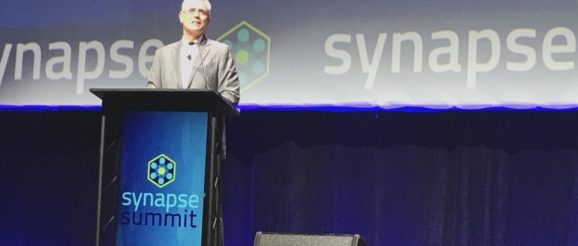USF President Steve Currall makes the case for ‘organized innovation’ at the Synapse Summit

Many people believe that innovation and entrepreneurship involve individuals working on their own who stumble upon a discovery.
That’s a myth, said University of South Florida President Steve Currall, one of the keynote speakers at the Synapse Summit.
The summit, now in its third year, is a startup and innovation conference produced by Synapse Florida. It kicked off Tuesday, Feb. 11 and will continue through Wednesday, Feb. 12 at Amalie Arena in downtown Tampa.
See highlights from Day One of the summit in the gallery below.
Currall, author of Organized Innovation: A Blueprint for Renewing America’s Prosperity, spelled out his vision for how business, government and university leaders play a pivotal role in bringing innovation to the marketplace, at a time when some other countries are “out-organizing” the United States in terms of the innovation process.
First, he took the myths around entrepreneurship to task.
The lone genius. Innovation is not about a solitary person working on his or her own. It takes the support of industry and a team of colleagues, Currall said.
Happy accidents. Sir Isaac Newton didn’t “discover” gravity when an apple dropped from a tree and fell on his head. He had been studying it for decades.
Free markets. Entrepreneurs are capitalists and the marketplace is key to innovation and entrepreneurship. “But I want to suggest there is a role for government in the innovation process,” Currall said, citing the Apollo moonshot and the Manhattan Project.
“Leaders in business, universities and government can intentionally help coordinate or create the conditions around the innovation process. It’s not just the lone genius. It’s not just accidental. It’s not just about the marketplace. It’s something we can do to catalyze the conditions that create entrepreneurship and innovation.”
There are three pillars to the framework Currall offered.
Curiosity is important and it can channeled to meet the demands of the marketplace, creating alignment between a university researcher and the corporate world. Channeled curiosity requires persistence. “Persistence is important in moving science and engineering discoveries down the commercialization pipeline.”
Boundary-breaking collaboration, involving the flow of information across science and engineering, universities and the corporate world, or government and industry.
Orchestrated commercialization. “This is a lot about what we’re doing today. It’s about bringing people together and connecting them. and creating a structure like Synapse that fosters and facilitates engagement of people that normally wouldn’t meet each other.”
USF wants to partner with innovators and entrepreneurs in the Tampa-St. Petersburg area and throughout Florida, Currall said. “University of South Florida wants to partner with you and work with you to help foster regional economic development.”
Here are some other highlights from Day One at the Synapse Summit.
[See image gallery at stpetecatalyst.com]
The post USF President Steve Currall makes the case for ‘organized innovation’ at the Synapse Summit appeared first on St Pete Catalyst.
